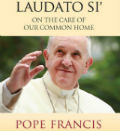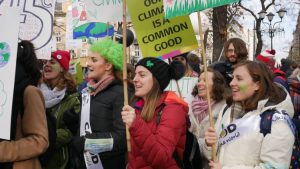By David Jackson, Shipley
Several J&P members in the diocese have just finished an on-line programme presented by the Global Catholic Climate Movement (GCCM – based in Rome) to ‘graduate’ as LAUDATO SI ADVOCATES in October. As part of the course, Dr Lorna Gold (Trócaire and GCCM) presented a sobering assessment of the growing existential threat posed by the climate emergency. Her paper of 2019, printed here, discusses the issue of Catholic Schools and their possible role in eco-conversion and action. It was written in 2019, before the onset of the pandemic. As our schools reopen, it is timely to see how she addresses the question of how to direct the energies and passions, understandable fears and apprehensions of pupils in Catholic schools about climate change onto the paths of spiritual and community eco-conversion – now in the additional context of the pandemic. This issue must concern all those charged with the welfare of pupils in Catholic Schools. It may well be that the time has come, because of the unprecedented pandemic but also because of the overarching unprecedented climate emergency, to begin to think and act in unprecedented ways – not only in our parishes but crucially in our schools.
The paper has also been brought to the attention of those charged with the oversight of our Diocesan Catholic Schools.
(Dr Lorna Gold is Coordinator of the Laudato Sí Project in Trócaire and vice-chair of the Global Catholic Climate Movement board. She is a member of the Laudato Sí Working Group of the Council for Catechetics. She also lectures in Maynooth University and is a member of the ministerial advisory group on the National Climate Dialogue. Her most recent book published by Veritas, ‘Climate Generation – Awakening to our Children’s Future’ tells the story of a mother waking up to the intergenerational challenge of climate change. Dr Gold gave a keynote presentation for the GCCM Laudato Si Advocacy programme in summer 2020. She argued that the situation is, if anything, more alarming and threatening than it was a year ago, before the pandemic.
CATHOLIC SCHOOLS AND THE CLIMATE STRIKE MOVEMENT
“I have come that they have life and have it to the full.” (John 10:10)
By Dr Lorna Gold (2019)
Context
 In September 2019, people from all over the world are preparing to mobilise again to call on governments to take urgent action on climate change. In the face of growing signs of climate breakdown, and slow response from governments, a truly global social movement has been emerging over the past twelve months.
In September 2019, people from all over the world are preparing to mobilise again to call on governments to take urgent action on climate change. In the face of growing signs of climate breakdown, and slow response from governments, a truly global social movement has been emerging over the past twelve months.
The movement is being led by teenagers, many of whom like Greta Thunberg, have been staging weekly ‘climate strikes’ – skipping school each Friday to highlight the existential threat posed by climate change. Other campaigns groups have agreed to join the teenagers in September in an unprecedented show of inter-generational solidarity in the face of the climate crisis. These groups include more established NGOs, as well as unions, faith groups and newer groups such as ‘Elders for a Safe Planet’, ‘Extinction Rebellion’ and so on. Above all, the call is for peaceful protests in as many places on the planet on the same day.
The science
The science on the current state of the climate is alarming. The events of summer 2019 have shocked even the most well qualified climate scientists. The summer has brought dramatic melting of the Greenland ice-sheet, unprecedented heatwaves in Europe, a ring of fire in the
Arctic Circle, and burgeoning methane lakes in Siberia. Most recently, the world has watched on as horrific fires in the Amazon rainforest burn uncontrolled. These fires driven by disastrous economic and political policies underpinned by a deep populist denial of climate change. Scientists have warned that the likelihood of irreversible feedback loops has increased dramatically in the past few months. This means that what is lost now is never coming back. The changes to eco-systems are permanent.
Many countries have called climate emergencies, but are at a loss when it comes to translating that urgency into policy implications. Those implications require far reaching political and social change. Without a massive sea change in public understanding and ‘buy in’ to the changes needed, the changes will be too late to avoid catastrophic limate change. In the words of campaigner Bill McKibben when it comes to climate change ‘winning slowly is another way of losing.’ At present, the world is losing the climate change battle. The most recent IPCC status report on keeping global warming below 1.5 0C came to the startling conclusion that the next decade of humanity is the most important since humans have stepped on this planet. Speaking at the launch of the report in November 2018, Deborah Roberts, the co-chair of the working group stated that: “The next few years are probably the most important in our history.”
Scientists have said that there is one decade to make the vast changes needed – but actually the next two years are critical given the long-term nature of policy change. The times we are living in are unparalleled. The stakes for the generation born and in school today could not be higher. It is against this backdrop of science, urgency and mobilisation that Catholic schools today are thinking about how and whether to engage in planned protests.
Catholic Ethos and Values
The engagement of Catholic schools in the whole issue of climate change very much calls into question the essence of what it means to be a Catholic school in the 21st Century. The specific purpose of a Catholic education is the formation of boys and girls who will be ‘good citizens of this world’, loving God and neighbour and enriching society with the leaven of the gospel. Beyond religious education, participation in the sacramental life of the church, fostering a sense of broader community, many schools are asking what is distinctive about the ‘ethos’ and ‘values’ of Catholic education. Pope Francis has challenged traditional viewpoints in three key documents [1] which all point to the need to rethink our Catholic identity in view of protection of Creation. In Laudato Si, in particular, Pope Francis states that: “Living our vocation to be protectors of God’s handiwork is essential to a life of virtue; it is not an optional or a secondary aspect of our Christian experience” (LS n217) He goes on to talk about the need for an “ecological conversion” which is also a “community conversion.”
 For Catholic schools, which are first and foremost called to be an authentic experience of living community, this call to ecological conversion and to be “protectors” is key to the definition of ethos in the future. Any experience of authentic Christian living, which witnesses to Gospel values, must model care for other human beings – but also for all the myriad of species in Creation. This goes from the very simplest of tasks, such as engendering responsibility to recycle well, to only use what is needed, to engage with nature in a loving manner – all the way up to how to challenge those negative behaviours and social norms that promote destruction of nature. Catholic schools have a key role to play in modelling and promoting simple living, sustainable consumption and, for example, avoiding the traps of fast fashion and youth trends which impact on the environment.
For Catholic schools, which are first and foremost called to be an authentic experience of living community, this call to ecological conversion and to be “protectors” is key to the definition of ethos in the future. Any experience of authentic Christian living, which witnesses to Gospel values, must model care for other human beings – but also for all the myriad of species in Creation. This goes from the very simplest of tasks, such as engendering responsibility to recycle well, to only use what is needed, to engage with nature in a loving manner – all the way up to how to challenge those negative behaviours and social norms that promote destruction of nature. Catholic schools have a key role to play in modelling and promoting simple living, sustainable consumption and, for example, avoiding the traps of fast fashion and youth trends which impact on the environment.
Courage of Gospel Witness
However, given the scale and urgency of the climate crisis, and the unprecedented threat to the next generation, it is right to pose the question of whether Catholic schools could play a more prominent role in publicly endorsing or participating in the global days of action for climate change – especially those led by teenagers. Such engagement would be based on the premise that climate change is at odds with a genuine and consistent ethic of life in all its fullness.
Teaching pupils about the Catholic values around life is only consistent within a much more integrated call to protect all life on the planet. Climate change is the greatest social injustice of our time. It speaks to the need for greater concern for those living in poverty and the common good. The call to witness to Gospel values challenges those in wealthy nations, those with high GHG emissions, to act in solidarity with those living in poorer communities affected by climate change. Acting to protect creation is also about witnessing to the fact that we are all global citizens and called to speak out on behalf of those who have no voice.
On the darker side, it is very clear from surveys that climate change ranks very high in the fears cited by teenagers and young people about their future. Many young people are facing high levels of ‘eco-anxiety’ and in some instances, this is leading to higher levels of depression and despair about their future. This growing anxiety is accompanied by a sense that the older generation has abandoned the youth to climate change and is unwilling to make necessary changes to their lifestyles to enable emissions reductions.
In light of this, the global days of action on climate change offer an important opportunity for schools in a number of ways:
– Taking part in a march or organising a protest can give students, parents and teachers a chance to work together as a wider community to do something very concrete and practical to give witness to Gospel values. Parents can be engaged in the creation of a day of action.
– Participation offers the school community a chance to witness to Gospel courage by being prepared to stand up and take a stance on the most important intergenerational issue – Working on a day like this fosters teamwork and builds up the sense of community in the school.
– Organisation and participation in marches, particularly if led by older students, can go a long way to counter the sense of hopelessness many are experiencing by enabling ‘active hope’
– Engagement in the day of action is a chance to live the vision of integral ecology – ecological conversion – in the school community. It does not need to end at the end of the day but can foster a conversation about Laudato Sí in action
– Catholic schools can bring a spiritual dimension to the protests through ensuring there are moments for prayer and reflection, and a blessing of those marching.
Addressing safety concerns and child protection
Child safety concerns are paramount for every school, particularly when it comes to taking part
in large public demonstrations. As well as the usual concerns over adult-student ratios, there are genuine concerns over public order, the risk that any protest could turn conflictual, and other related concerns. As with any such participation, the primary concern has to be the pupil safety and well-being. Local guidance from police and public authorities should be listened to.

Many schools have engaged in large protests successfully. Some have closed early in order
to facilitate student participation. Others have organised buses to attend events as an
extra-curricular activity. Some have integrated participation into a whole day of activities around ecological action, involving parents and students. Participation in a large
event, however, is not essential. In many ways, localised events organised by schools in individual parishes and towns can be just as impactful – if not more. Doing these in a coordinated way – on the same day as the global protests – can make the students and
community feel part of the global day.
Some examples from Ireland:
– On the 4th anniversary of Laudato Si, 24 May 2019. St. Mary’s Secondary School in Lisdoonvarna organised a morning of events on ecology in the local town hall. The upper school marched from the school down the main street to the town hall.
– A Catholic primary school in Dublin held art classes making banners about care for creation before the major protest on March 15th. They then held a march in a circuit down the street in front of the school and back around. They received thousands of ‘hits’ on social media.
– Tree planting on school grounds held in many schools – with grandparents helping younger children plant trees on the day of action.
– In Maynooth, the local secondary school joined the local ‘Maynooth Community Climate Action’ group on the town square for a protest during lunch break. The local police and volunteer stewards helped guide the students. Several hundred local people took part in the protest which was led by the teenagers.
